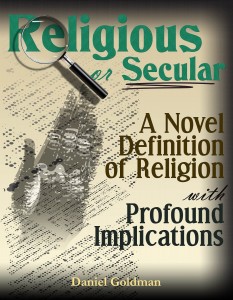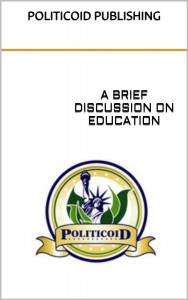This title exists to act as a framework for the Politicoid Series. It consists of a summary of the current works in the series, commentary on those works, and various reference material including answers to frequently asked questions.
[extoc]
Format
For now, all books will be available as an ebook through the Amazon Kindle platform or, if in draft, as an article on this site. However, you don’t need a Kindle to read these books. You can use the Amazon cloud reader or the Kindle app on your phone or tablet.
A Brief Discussion on Education
Kindle Link: http://www.amazon.com/dp/B00DEI5X8Y
A Brief Discussion on Education was the first book written as part of the Politicoid series. Admittedly, it’s a bit rough around the edges and a second edition should be released. In addition, some interesting events have occurred since the book was published.
As the title suggests, the book is short and is about education in general. However, it focuses on the American education system, how it compares to foreign systems, and what can be done to improve the system. It looks at the early history of education in America, how it was based on a system of religious indoctrination and how industrialists have used the system to create useful workers rather than a well educated population.
Regarding the event mentioned earlier, Finland has decided to switch to a completely topic based approach. This means a complete end to subject based education and so is similar to the home room approach mentioned in the book. However, whether or not all subject based learning should be eliminated is unclear. It seems more reasonable that a combination of topic, subject, and activity based learning is needed to create a well rounded student.
Religious or Secular
Kindle Link: http://www.amazon.com/dp/B00TPZ11B8
 The goal of Religious or Secular was to open up a dialog regarding the nature of religion and to bring into question whether or not those ideas which we believe to be secular truly are. Much of my views on the topic were excluded from the text itself in order to maintain more of a neutral position. I didn’t want to piss anyone off. Unfortunately that may be impossible given the nature of the assertions in the text. I also excluded personal observations as much as possible, as those are not scientific in nature. I will however address many of those observations here.
The goal of Religious or Secular was to open up a dialog regarding the nature of religion and to bring into question whether or not those ideas which we believe to be secular truly are. Much of my views on the topic were excluded from the text itself in order to maintain more of a neutral position. I didn’t want to piss anyone off. Unfortunately that may be impossible given the nature of the assertions in the text. I also excluded personal observations as much as possible, as those are not scientific in nature. I will however address many of those observations here.
Empirical Evidence
One aspect which I should have touched on in greater detail was the concept of empirical evidence, since it rests at the core of the religious filter. In my haste, I did not stop to think that empiricism might be considered in a rather vague way. To me, empiricism is rather straight forward, but that has to do with my background in science. Empirical evidence is generally considered to be evidence that is obtained through the senses. But it does not exactly include all personal experiences. Saying that you “feel something in your heart” does not mean that you have obtained empirical evidence. Likewise, if 100 people claim that they have “seen a ghost,” that does not mean that we can use that as empirical evidence. Neither does experiencing something while meditating. Why not? Because individual perception is not reliable. This is true, even if 100 people all had similar experiences. This is because they are different events and different observations.
If however two people witnessed the same event, that would constitute empirical evidence. Why? Because it is unlikely that two people will experience the same event if the event did not really occur. The greater the number of people who experience the event, the more likely that the event did indeed occur. Of course, there are even exceptions here. If there is some kind of toxin in the environment, and there is shared knowledge, the brain may create similar delusions, as is the case in “shared psychotic disorder.” But even this becomes increasingly unlikely with repeated observations.
Repulsion to the Idea
Probably one of the most frequent observations that I’ve made is the absolute repulsion by atheists to the idea that some forms of atheism are religious. This may have to do with recent studies which try to link lower IQ to religiosity as well as attempts to portray religion as being a source of violence.
Christian Atheists
Another observation is the general view of what makes a religion a religion and the concept of god both by atheists and by religious individuals. When atheists address religion and “god” they very often focus on what is essentially a Christian worldview. Indeed, concept of god that they rely upon is the god of the Abrahamic traditions: a masculine, all omnicient and omnipotant being which watches and judges us all and takes an active role in the universe. This is the creator god of Christianity, Judeism, and Islam which existed before the universe and created everything else that now exists.
Many also still cite the mythology surrounding Egyptian slavery and the battle of Jericho. Modern anthropological analaysis suggests that, except in a few cases, the pyramids were built by Egyptian citizens as part of work programs, not by slaves and likewise, the battle of Jericho probably never happened. Instead the Israelites, who were Canaanites, simply walked into a city which was abandoned at the time.
This may stem from the possibility that many, if not most, atheists were once Christian. While they now reject Christianity, they still use it as a model for what they believe to be religion. In this way, many atheists in the world are what might be called “Christian atheists.”
The Philosophy and Science of Politics
Link: http://politicoid.us/science-and-philosophy-of-politics-chapter-one/
Currently this title is being offerred in early draft form on this webpage. Since the work is such a large undertaking, the added feedback is more important than immediate sales through Amazon.
As the book’s title suggests, the work is an attempt to give a solid introduction to various topics of philosophy and science that are useful in understanding political discussion. This includes a foundation of logical reasoning, philosophical razors, and mathematics, to explanations of biology, chemistry, physics, anthropology, and other fields of scientific exploration.


